Management: Vague character-arc spoilers for a few shows here – FLCL, Eva, Tatami Galaxy, Cowboy Bebop, Hyouka. Hyouka’s the only one I get particularly specific on.
Gonna share something a little different today! Recently I’ve been thinking about characters, which is probably because I am always thinking about characters. While a lot of my personal views on character writing have obviously come from reading and watching a whole lot of stories, a fair amount of my understanding has also come from writing characters. As a fiction writer, knowing how to write a fleshed-out human being is rarely optional – but even just as someone who just wants to poke more deeply at the things they consume, I think analyzing characters from a character-creation standpoint can be very enlightening. Characters are kind of like trees – though the individual branches of their actions may look strange and circuitous, generally everything winds its way back to the central trunk of their base nature and desires. And looking at characters trunk-first can do a whole lot of work to make sense of their wildly winding limbs.
So let’s get down to that trunk, to the absolute base nature of a character. There are a few ways to approach this, but personally I think the easiest way to consider character writing is to start with two key variables. The two often-conflicting desires that tend to define their choices, their conflicts, and their ultimate resolution: what they want and what they need.
What a character wants is simple. It’s their goal – it’s the thing that consciously drives them forward. It’s whatever they think would make them happy. Naota from FLCL wants everyone to respect him like they respected his older brother, and so he tries to act like how he assumes adults act. Shinji from Evangelion wants to avoid being hurt, and so he takes the path of least resistance and avoids dangerous contact with others. Watashi from The Tatami Galaxy wants to experience the mystical rose-colored campus life, and so he joins a wide variety of clubs and continuously reinvents himself.
What a character wants is basically what they, from their very biased and unenlightened early position in the narrative, believe will “solve” their personal journey. Their actions are aimed at fulfilling it, and their character “performs” a self in a way designed to acquire it. If you asked them what they wanted, it is what they would tell you. It often sets the plot in motion, but it is almost always ultimately a lie.
Characters, like people, often have a hard time understanding themselves. In a narrative, this is most fundamentally expressed through the ways they either don’t understand or can’t accept what they actually need. What a characters “needs” is what will actually resolve their core issue – it is the hard lesson or truth that their conscience “want” is normally just attacking the symptoms of. Naota doesn’t actually need to become an adult – he needs to learn that it’s okay to be a kid, to be earnest, to be wrong, to grow. Only then will he able to escape the shadow of his brother, and actually move towards acquiring what he initially desired. Shinji needs to accept the pain of human connection – though he moves away from it because it is easier, in order to escape his unhappiness, he must embrace the pain of contact and move forward. And Watashi needs to learn that there is no such thing as a rose-colored life, and in doing so see the beautiful colors that have been around him all along.
What a character needs often stands in direct contrast to what they want, and the two are almost always reflective of each other. The “want” is often either a symptom or consequence of escaping the “need” – it is either a way of avoiding taking the harder path, or the result of whatever makes the hard path impossible in the first place. Spike from Cowboy Bebop exemplifies this contrast – he “wants” to either live in or ignore his past, but he “needs” to acknowledge it and move on. Because he is unable to transition from his want to his need, the story has an unhappy ending. “Need” tends to represent the person a protagonist either fundamentally is or has to become, and “want” tends to represent the way they are running from it, or the thing they think could make them happy even if they avoid acknowledging their “need.”
Want and need are one of the fundamental building blocks of internal conflict, but they also express themselves in more overt, personality-based ways. What a character “wants” often informs their conscious self-image – it is reflected in who they think they are, and thus how they tend to interact with others. In contrast, what they “need” tends to be reflective of who they really are, and thus the actions they take when the chips are down. Shinji demonstrates this very well – he overtly pushes others away all the time, but ultimately will take actions designed to make others care about him. You could even apply this to the classic “tsundere” character type (I hate you! But secretly I love you) – their overt actions and their underlying desires are continuously at war, because they are unable to embrace their own internal self. So yes, if it takes mapping “want” and “need” to “tsun” and “dere” for this to make sense as two halves of a person, then go with it. “I want that jerk to leave me alone… because I can’t admit to myself that I am a vulnerable person who deeply desires their affection.”
The nice thing about want and need is that they kind of form a dramatic circle all by themselves. “Want” is comforting, because it is an easy goal to strive for that doesn’t require self-reflection, whereas “need” is painful, because it generally requires reflection and personal growth. Meaning that a person can pursue their “want” for a while, come to see a piece of their “need,” acknowledge it, become hurt, and retreat to their “want” again. “I can’t go back on the field – they’ll kill me out there!”, “How can I learn to love again?”, etc – pursuing “need” inherently implies risk, and when you’re actually punished for it, that naturally leads drama back around to a “want” that protects the character from future harm. “Want” promotes narrative, which can lead people to revelations that reveal their “need,” which can lead to pain, which returns characters to a safer “want.” When I say “conflict should emerge naturally from characters,” this is a large part of what I am getting at – when a story’s conflicts come about because a character is doing what comes naturally to them, it becomes much more personal than if it were simply arbitrary, external conflict impeding their progress. And when conflict is designed in this way, the resolution of that conflict directly lends itself to character growth – the character development is both natural and a fundamental reflection of the show’s conflicts.
Not every character will have a want and need, of course. These desires are generally the foundation of an emotional arc, so if your character simply plays a bit part in the story, they likely won’t have one. The thing about introducing these elements is that fully articulating them generally means you need to actually pursue them, and not every character can or should change as a person. And some stories simply aren’t about character growth (gasp!), or require characters to actually remain static to make their points (like Cowboy Bebop), in which case the gap between want and need will never be closed by the narrative. That said, minor characters are still people, and their actions should still be reflective of human beings with conflicting needs and desires even if the trunk underlying their actions is never made overt by the narrative.
As Cowboy Bebop demonstrates, there isn’t always a clear progression from pursuing an overt want to acknowledging and embracing a fundamental need. They’re just two elements that make up a character, and though the traditional character growth arc tends to follow that formula, you can actually play with these variables in a variety of interesting ways to promote specific effects. Hyouka’s a great example of this – there, Oreki’s overt “want” is to pass through life without expending energy, whereas his underlying “need” is to find a passion that actually makes use of the inquisitive mind that separates him from others. Oreki actually does follow the traditional character-growth arc throughout Hyouka, but this is complicated by the fact that his romantic arc with Chitanda works against this personal arc.
As Oreki becomes more and more of a full human being with an interest in pursuing his talents, he actually becomes less and less of a person who could be satisfied sharing the peaceful life Chitanda has waiting for her. This tension, the conflict between Oreki embracing his underlying need and the resolution of the series’ romantic narrative, is what makes Hyouka’s ending so unique and so powerful. (Incidentally, this is also a great example of “earned” tragedy – Chitanda’s positive influence on Oreki directly resulting in him becoming a person unable to return her affections is about as natural and poetic a tragedy as you could ask for). Additionally, in contrast to Oreki embracing his need, his friend Fukube’s personal arc is left unresolved entirely, and that’s intentional. Like music, stories are built on tension and release, and sometimes leaving a story with tension unresolved actually creates a more powerful or real-seeming effect. This tension doesn’t come from specific word choices or dramatic setpieces (though those too have their own rhythm) – it comes from the slow-building dramatic inevitability of a story’s fundamental variables. And a firm understanding of the distance between a character’s overt desires and underlying needs is one of the most powerful tools available for marshaling this tension towards a specific audience impression of desire, lingering questions, or catharsis.
That’s all I’ve got for today! Hope you enjoyed this craft-ramble, and I’ll try to come up with another related topic soon. And let me know in the comments if there’s any part of storytelling you’d be particularly interested in hearing about. I have no shortage of opinions!

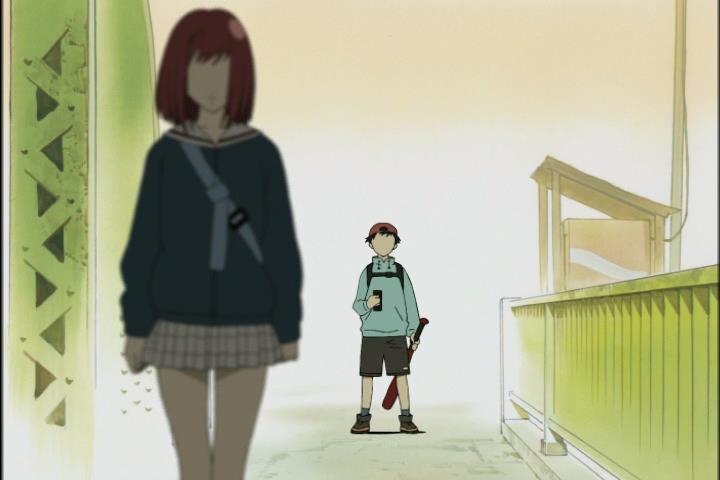
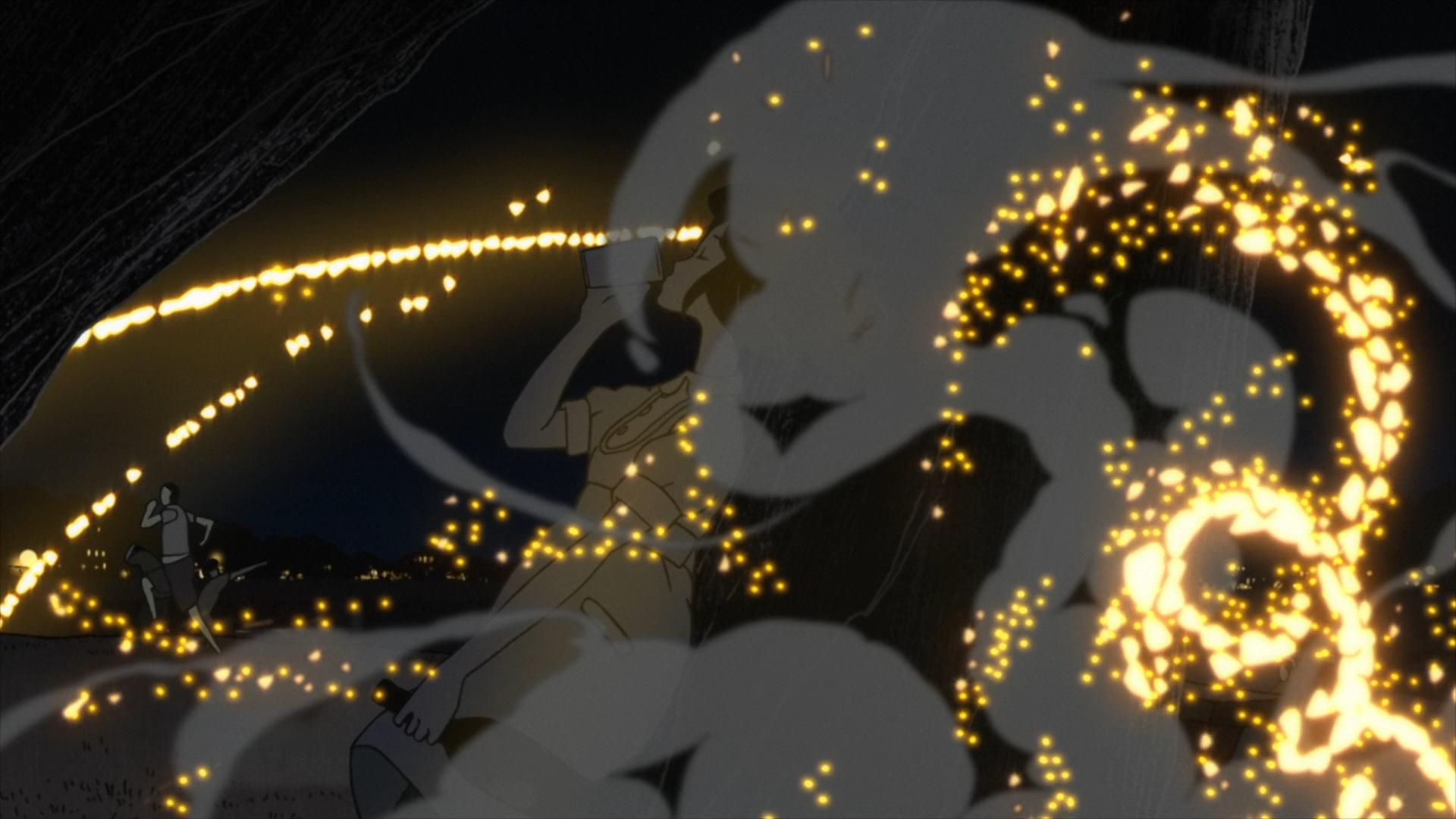
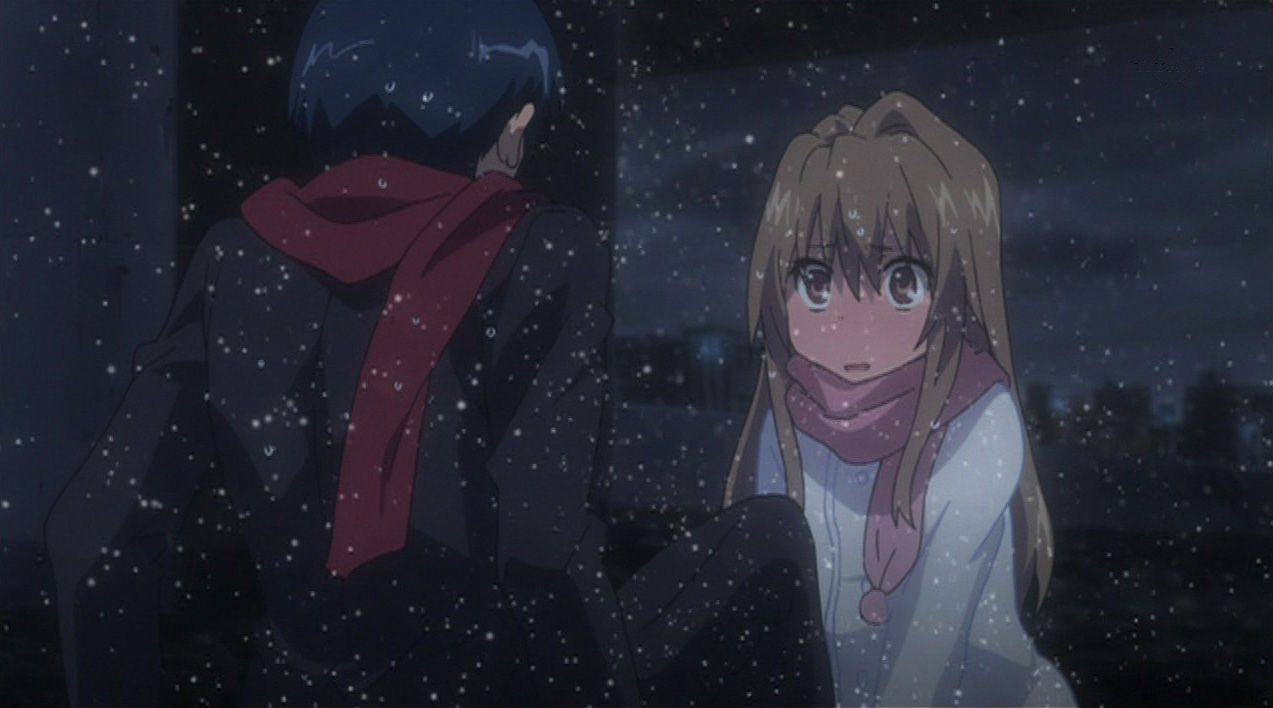
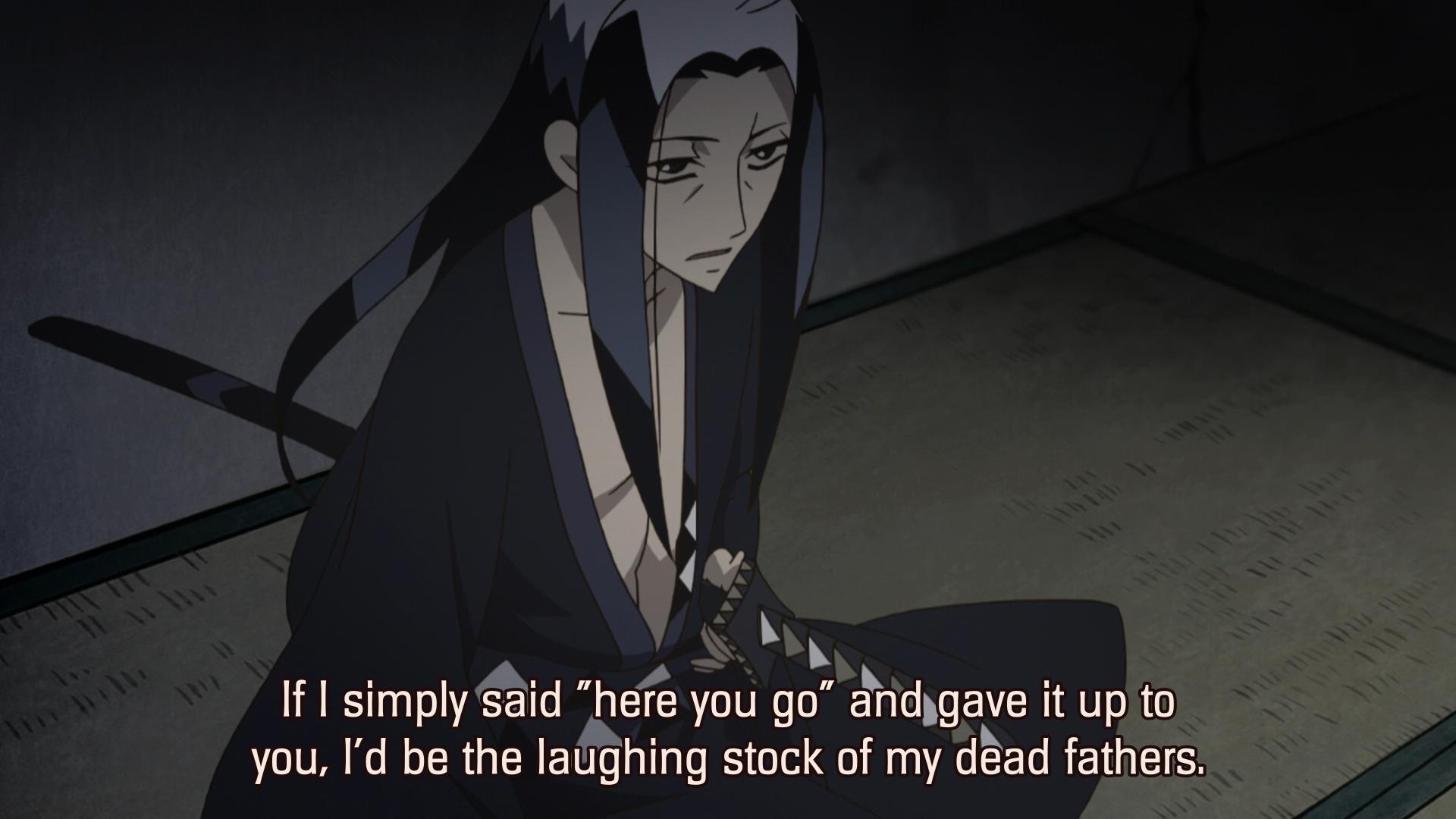
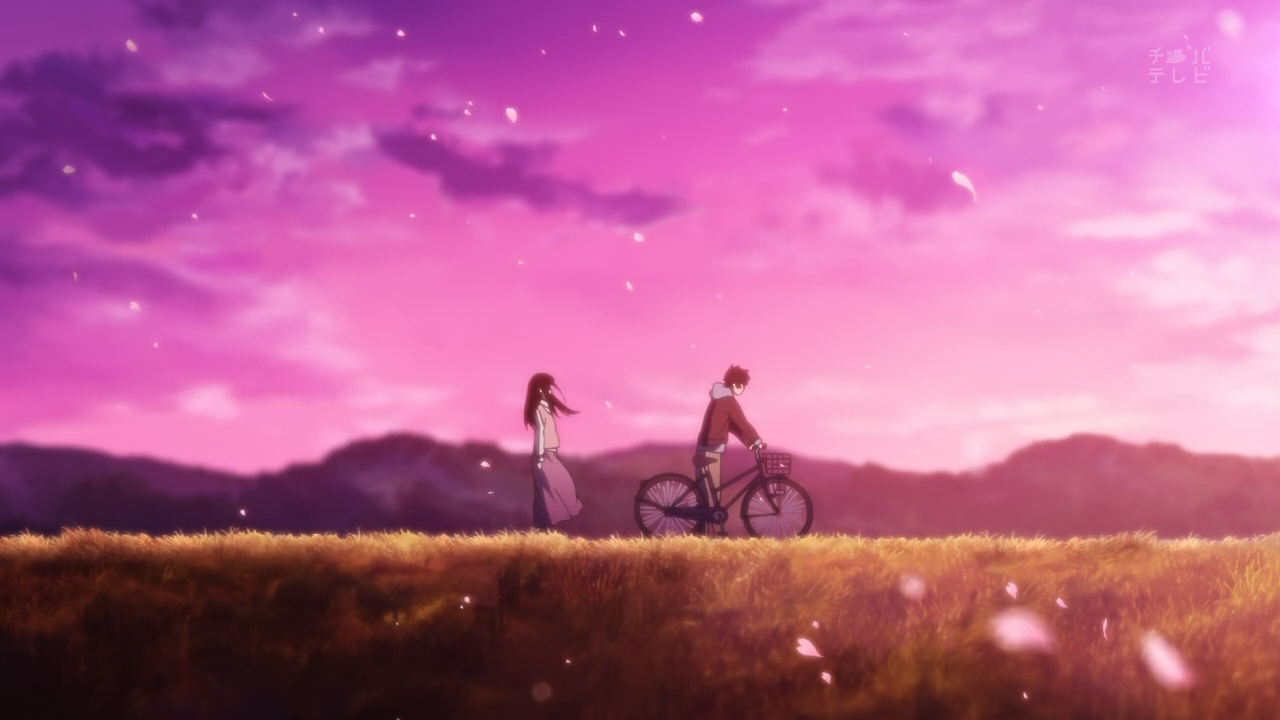
Can’t wait for your Ping Pong series review 2 months from now
Wow. Your points on the ending of Hyouka just blew my mind. I was crapped out on painkillers from getting my wisdom teeth out when I watched it, and could make little sense of it… but even if I weren’t, that would STILL have gone far over my head. Kudos to you, sir. I feel like I missed the point of the show entirely, now. I might go re-watch it just to see it from this new perspective you’ve given me.
http://imgur.com/6Bsu4jV
A lot of people see the ending of Hyouka as the opposite, where the last episode was Oreki admitting to himself that he does really like Chitanda. While he couldn’t get his confession out, he thought about it which is something he never did before. Also, here’s this: http://i.imgur.com/AUlpbJh.png
Plus there’s the fact that the novels are still ongoing of course.
Oh, I’m not arguing that the two of them haven’t fallen for each other – that’s clearly true, and it’s also true that Chitanda is the reason Oreki has found his rose-colored life. I’m also not saying there’s no way they’ll end up together in the end – I’m actually quite interested in seeing how the story resolves. I’m am saying that Chitanda’s influence on Oreki has created a conflict of his ambitions that did not originally exist, and Chitanda’s words in the last episode are a direct reflection on this conflict. Chitanda cares about Oreki enough to worry that she might not be the best person for him, and so her final speech is basically a warning of what staying with her would imply. How that conflict will resolve itself, I can’t say.
Yep. There is surely more than one possible future line the story could follow, but the pivotal point Hyouka’s narrative moved towards and left us at was one of an underlying incongruence with no apparent immediate resolution, that came out of a friction between desires and needs; for both couples. We got both extremes in the final episode: the “passing-the-bridge” metaphor and his “leave-your-business-to-me” daydream clearly discloses Oreki’s desires, yet he is unable to utter the words openly in the end. We know his hesitation is not out of simple shyness because he asks himself if “this was how Satoshi felt back then”—it couldn’t get any clearer in terms of dramatic structure, even if it’s indefinite plot-wise, I think. (I guess I just re-phrased your comment but oh well…)
Gaah, this just makes me wanna watch it again. One of those rare gems that just keeps growing on you the more you think back on it.
Well damn, count me among the people who also looked at the ending of Hyouka completely differently and I think I’m going to have to disagree here. First, as Link as already mentioned, the novels are still on-going so it feels strange to say that the story is already capped off, especially in the case of Fukube where i thought it was less that his character arc was unresolved but rather wasn’t resolved yet, it’s a slightly different nuance. Also, Chitanda I don’t think represents a warm and safe life for Oreki because in some ways she is the one who inspires him and the one who pushes him to use his intellect to the fullest and if they were to live together I can’t imagine that every stopping. Also, the way you worded this made it sound like while Oreki is progressing Chitanda would make him revert back to his old self which goes totally against the tone of Hyouka and that was nothing if not a carefully constructed story, if that was the intent I can’t see that theme and the series tone of slow growth coupled with hidden feelings and half truths being deliberately paired together.
Fukube’s arc hasn’t been resolved yet, but I think that lack of resolution actually worked extremely well for Hyouka. I know this is kind of the necessary consequence of adapting a work that doesn’t have a definite conclusion, but it feels very real to me that both of Hyouka’s central romantic tensions are left with some uncertainty by the ending.
As for Oreki, Chitanda is definitely the one who inspired him, but it’s now an open question what he does with that inspiration, and I think that is what Chitanda is specifically concerned about when she makes her speech about what her life will be like after graduation. Yes, she inspired him – but now that he’s inspired to actually pursue life, what will he want to achieve with his talents? That’s the open question of the ending, and the conflict between his and Chitanda’s futures as I see it. Staying with Chitanda wouldn’t make him revert back to his old self (as you say, she inspires his own curiosity), but it might not be the right choice for him all the same.
Of course, it might also be the right choice, and the novels haven’t ended. But I think the mere existence of this possible conflict of futures is definitely there in what Chitanda is saying at the end.
Need and want, that’s pretty interesting way to look at things, I’ll remember that.
Your interpretation of the Hyouka ending is completely different from mine. I have trouble even looking at it from that perspective.
A great overview of proper character craft, but I’d have to contest the conclusions you derived from the Hyouka and Cowboy Bebop examples you brought up.
For Hyouka, I don’t quite understand the reasoning behind tragedy you brought up. Not that the ending is absent of tragic notes, what with Chitanda’s bittersweet resignation to her culture’s roots, but I don’t see how that somehow equates an Oreki ultimately refusing to settle down with her. Oreki’s still an individual who tends to see a glass of water half empty, and I don’t think there’s a problem with that. Skepticism in moderation’s healthy after all, and it’s what has helped him solve most of the cases he accepted to take, Chitanda’s included. It’s just Chitanda allows him to recognize that the water in the glass is water regardless, and water’s a precious thing. The show doesn’t encourage Oreki to become like Chitanda, but recognizes that there’s value in the type of perspective Chitanda possesses, just as she likewise sees worth in his. She balances him, giving him space to breathe, making him see beyond the extreme he’s consistently maintained before meeting her, but that doesn’t mean he’ll end up at the other extreme by the end of everything. The ending is less a denial of her as it is the gradual denial of his static self for her, who is inextricably linked to his self of becoming. It’s not something he’s fully able, at the present, to say, what with him not being able to confess what he felt out loud.
For Cowboy Bebop, I saw that ending as more Spike trying to come to terms with his past rather than avoiding it. The entirety of the show was pretty much him doing just that, scraping by under the Vicious’ specter, living a dream, and his final confrontation with Vicious was his way of confronting reality, that no matter where he went with his life from now on, whether he’d continue bounty hunting with Jet, or elope together with Faye, Vicious would be there to make his life and his associates’ lives miserable, actively even, since Vicious became the Red Dragon Syndicate’s leader. Vicious wasn’t someone he could simply ignore anymore.
See my other replies here – my feelings on Hyouka are less dire than the post may imply. That read of Cowboy Bebop is perfectly valid, though I actually think Spike and Vicious’s relationship is even more nicely linked than that. I think each of them kind of represent a different method of avoiding moving on – while Spike runs from his past, Vicious tries to recreate it, and construct a version of the Red Dragon Syndicate that no longer applies to the modern world. In the end, they cancel each other out.
I understand where you’re getting at with Hyouka now, though I see Oreki more at a crossroads veering towards a Chitanda end than anything else at this rate. Though yeah, the books are still on going.
I’d be more sympathetic to that perspective if there was more on Vicious’ character to go on. Outside those brief, recurrent flashbacks of Spike’s and Vicious’ days together in the Red Dragon Syndicate, we really nothing else save him living up to his namesake and his ambiguous, obsessive enmity against Spike.
Regarding Vicious, I can at least remember two very specific scenes to go off of – Vicious’s interactions with his and Spike’s mutual friend in Ballad of Fallen Angels, and the scene where he murders the syndicate council. In both of those scenes, the other parties tell him he’s basically a relic, and that business isn’t conducted through violence anymore, and he ends up killing both of them in his quest to prove otherwise.
Now that you mention it, that does rather ring a bell. Fits why he’d hold a grudge against Spike for leaving the Syndicate, the potential of Spike turning in his gun permanently and all of that.
Must have felt like betrayal to their partnership.
I agree with the points concerning Vicious, but I think zeroeq011 is right on Spike in that he actually does confront his past–it’s just that it happens at the very end. I believe this because of a very important setpiece: Julia.
Now, it’s been awhile since I saw CB and I don’t quite remember why or how she reappears, but I do remember clearly that he thought she had betrayed and abandoned him, but as they encounter each other, it turns out she hadn’t. This gives him a final chance to live a new, different life with the person he loves (I can see arguments for this as his first moment of “moving on” and as also an escape from his past, too). But she dies–he is unable to save her.
It is in this moment that I believe Spike does and 180 and realizes he can’t escape his past anymore. He got up and left the Syndicate and Vicious, and they killed Julia. Thus he comes to grips that it’s time to return, and face them, and finish Vicious… and as he of course realizes, most probably himself, too. Both relics of a past he must close; I think he knows if he survives it’s like coming back from the void, reborn, but it’s absolutely vital that, like the fenix, he personally sets his own past on fire.
Solid writeup, by the way.
So, would you say that the conventional screenwriting technique of giving a character a “goal” to be working towards through the course of a movie is a simplification of the writing you’re talking about here?
It seems to me that, in most movies, the want and need are conflated. Obviously, there are time constraints which almost necessitate this, as movies don’t have the luxury of multiple episodes (and a lot more screentime) to play the want and need against each other.
I feel like movies tend to shorthand the want-need arc by conflating it with the romantic arc. The romantic interest provides what the protagonist needs, which either helps them achieve their want, or reveals that their want was a false one.
The role the goal plays depends on the themes, I think. What is the purpose of mythology goals, like in Lord of the Rings? Character development stemmed from the settings surrounding the goal, rather than the goal, and was impressed upon the characters, not one they really naturally desired.
If it’s not a purely narrative-focused story, then they generally either do that or (very often) do what arbitrary_greay mentioned, and basically make the romantic resolution the “need” resolution. But films with more character focus generally do create reasonable want/need contrasts. Think of, say, DiCaprio’s character in Inception – that’s ostensibly kind of an action/thriller, but the contrast between the past he wants to reclaim and the steps he must take to move past it form the climax of the film.
As for the theme of Cowboy Bebop, that’s a great theme and all, but I stand by my perspective that the anime did not do a good job conveying it, for several reasons, some of which were mentioned in my previous comment.
One these reasons is that Cowboy Bebop doesn’t put much emphasis on this theme except in the Vicious episodes. And though we may disagree about whether or not Bebop needs to do so, or whether the Vicious arcs should be representative of the narrative as a whole, I personally believe that as a whole, Cowboy Bebop does not take the steps necessary to communicate that cohesive theme, and as such, at least in my mind, I have to score it down.
I would argue that the structure of Cowboy Bebop, where the theme is addressed mainly in the episodes with Vicious, is important. In all the other episodes we learn about what kind of problems the Bebop crew have on a day to day basis, what role each of them plays aboard the ship, who they know outside the ship, etc. It’s the life that Spike could have if only he was able to move on, but his past keeps coming back to him and interrupting that life over and over until he finally decides to come to terms with the fact that Vicious will never stop pursuing him.
I’m fairly certain that it has been Spike pursuing Vicious. Julia and Spike were marked by the old generation triad.
Disregarding that, I did not get the sense that the other episodes displayed the life that Spike could have if he forgot about Julia. Episodes are often dedicated to other characters; as I said, there is often little character interaction between the main cast. And neither do they display any life that Spike can have that is inherently good, valuable, or even normal, e.g. fighting an experimental soldier or resolving the nazca lines are not common, day to day occurances. As Bobduh mentions, Spike is evidently living in the past and getting his thrill out of the bounty hunting buisness.
I have a problem with Spike shrugging off the tragedies that occur around him. They never make any lasting impact on him, and I think that’s a large misstep. Spike’s choice at the end of the series was several times less powerful than it might of been (for me at the least) because Spike discards the basis for making his choice from episode to episode, besides in the Vicious arcs.
I don’t see why the life had to be good or normal. Just different, and maybe slightly more pleasant since he and Jet seem to be pretty good friends.
And you’re right, it’s Spike who pursues Vicious, not the other way around. I still stand by what I said; he doesn’t actively seek Vicious out, but when they cross paths it makes Spike aggressive and he feels compelled to do something.
I also don’t know that it actually makes that big of a difference whether he wants to live in his past or ignore his past. Either way, he would be absolved of what he sees as a responsibility to protect Julia and/or kill Vicious. It’s also why he adopts his “whatever happens, happens” mindset. If he believes in fatalism, then he doesn’t have to attach himself to any further perceived responsibilities.
Nice post. We’ve been taught the same thing in my film classes. “Character A wants ___ but by the end realizes he needs ___.” We’ve also talked about a character’s scene need (what that character wants in that moment) and how that balances with their life need (the overarching goal).
Yeah, that’s another important contrast to keep in mind. Characters act very differently towards their overarching and immediate needs.
I do agree that there is a lot of potential in Houtaro if he chooses to move away from Chitanda, but I don’t quite agree with the idea that Houtaro’s romantic arc is necessarily against his personal one. I’ve felt that Houtaro’s “need” was genuine, tiring, and painful human connection, and his realization of his romantic interests along with his pursuit of a romantic relationship would also bring him closer to the development of his personal arc.
Personally, I feel his need is ambition – he doesn’t really have trouble communicating with others, but he does have trouble applying himself.
Pingback: Spring 2014 – Week 7 in Review | Wrong Every Time
And as a small observation, I would like to point out that in addition to what you already mentioned, Naota “wants” a life that is amazing, and he “needs” to realize that life already is amazing. When he runs off with Haruko near the end, it is clear that she represents that “amazing/beyond words/unpredictable” life, in the form of what’s beyond his town: “But now Haruko is here. That’s how I know there really is a world outside.” (that’s Naota’s literal quote which I just googled). But he needs to realize that his OWN life can be amazing, right there, inside his town, which is why he stays there at the end of FLCL. Perhaps he will want to follow Haruko when he grows up, but I think he realizes he must first grow up, slowly, and build his life, and make his home a place he can call “home”.
That Hyouka insight was a gem hewn from the halls of Valhalla!
Thank you!
Pingback: The Rising Tide: Madoka Rebellion and Communal Culture | Wrong Every Time